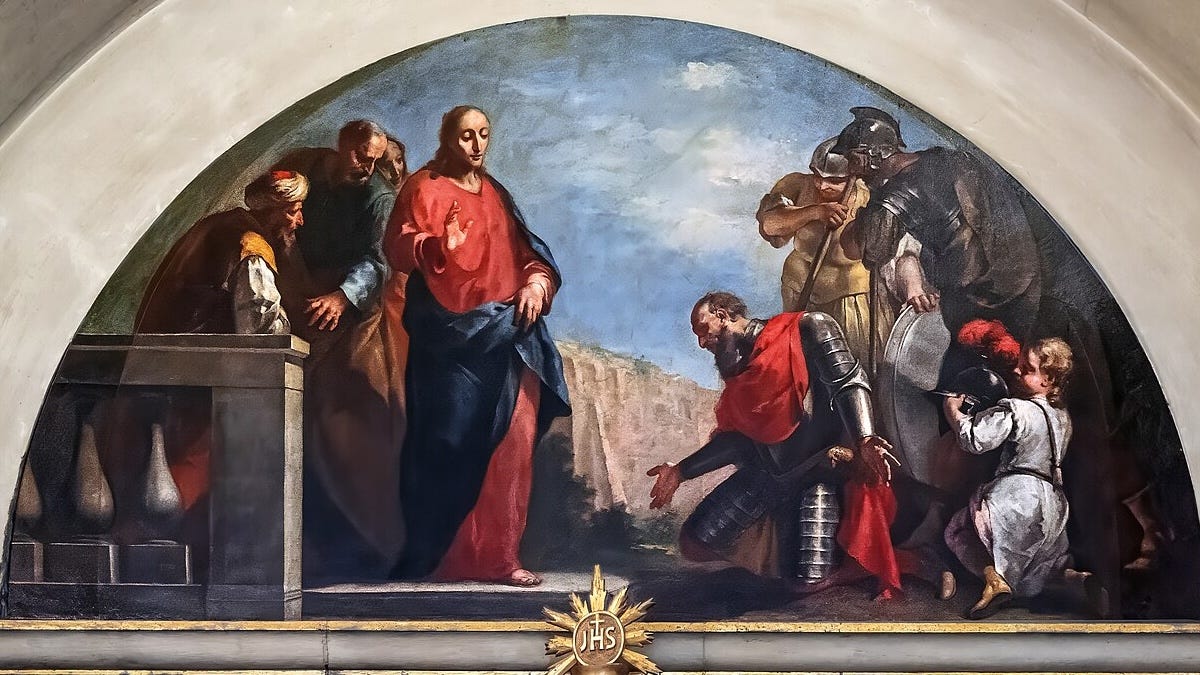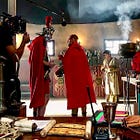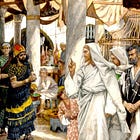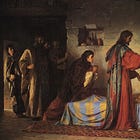Why did the Centurion say not to come 'under his roof'?
The quality of the gentile Centurion's faith was a standing rebuke to those of Christ's own people.

The quality of the gentile Centurion's faith was a standing rebuke to those of Christ's own people..
In this part, Father Coleridge tells us…
Why the Centurion, unlike others, recognised that Christ’s authority over life and death did not require His physical presence.
How the Centurion’s humility and faith contrasted with the pride and scepticism of many among the once-chosen people.
What this moment foreshadows about the inclusion of Gentiles in God’s Kingdom and the rejection of the unfaithful among Israel.
He shows us that the Centurion’s faith—marked by his belief in Christ’s word alone—provides a model for the Church, where trust in divine authority surpasses visible signs and points to the universal scope of salvation.
In the previous part, we compared Fr Coleridge’s explanation of the Gospels with the presentation in The Chosen series.
The Centurion whose servant is healed is a key character in the popular series The Chosen, and the story arc for ‘Gaius’ is crucial for driving the series forward.
But how accurately does it portray him? What does the series get right, and where might it have missed the mark?
See here for more:
This is an ongoing mini-series on Fr Coleridge’s presentation of this incident in the Gospels. Hit SUBSCRIBE now, so as not to miss the next ones:
The Centurion’s Servant
From
The Training of the Apostles—Part II
Fr Henry James Coleridge SJ
1882, Ch. X
St. Matt. viii. 5–13; St. Luke vii. 1–10
Story of the Gospels, § 50
Third Sunday after Epiphany
St Matthew and St Luke
St. Luke, as was natural with the Evangelist who wrote especially for the Gentile Churches converted by the preaching of St. Paul, seems to have drawn his account of the incidents of this miracle, either from the good Centurion himself, or from some of his friends. His account is that of one who stands, as it were, by the side of the Centurion in the whole scene.
St. Matthew, on the other hand, seems to stand by our Lord.
St. Luke tells us first how the master of the servant who was at the point of death and in great suffering, set a very high value on his services. ‘He was precious to him.’ Then he tells us how he begged his friends among the Jewish elders to go to our Lord, Whose arrival in Capharnaum had just taken place, and ask Him to come and heal the servant for whom he is so anxious.
‘Jesus,’ as St. Matthew says, ‘said, I will come and heal him.’
St. Luke only tells us that our Lord went with the elders of the Jews. It would seem that either His near approach was notified to the Centurion, or that he conjectured that He was approaching, for the thought of this extreme condescension filled him with a holy fear.
When our Lord had put off the nobleman who had come about his son, the latter had urged Him to come before his son died. He had no hesitation as to putting Him to so much trouble. The Centurion, on the other hand, when he heard that our Lord was actually on the way, bethought himself at once of his own unworthiness.
But it was not simply the thought of his own unworthiness that filled him and dictated his message to our Lord—it was the conviction in which the nobleman had at first been lacking, that it was quite as easy for our Lord to cure the poor patient at a distance, as by coming Himself to his bedside. Thus our Lord drew out from the nobleman, by His seeming reluctance to grant his prayer, the more perfect faith which the Centurion already possessed, and from him our Lord drew by granting his petition in the very terms in which it had been made, the profession of this higher faith which He had not met with in Israel.
If our Lord had not at first checked the nobleman, he would not have risen to the faith that He could heal at a distance. If our Lord had not intimated His assent to the request of the Centurion, He would not have given him the occasion of the profession of this higher faith.
‘Lord, trouble not thyself’
‘Who was he,’ the Centurion said to himself, ‘that this great Prophet should come to his house—should tread the floor of a Pagan dwelling, and enter a household the greater part of the inmates of which were perhaps still Pagans? Why should he trouble Him so far?’
Had He not commanded the fever to leave the mother of St. Peter’s wife, as well as healed the son of his friend at a distance of many miles? He had himself been afraid to go to our Lord on account of his nationality and his other grounds for humility, and could he let Him Himself come to carry out his prayer?
He had still by his side other friends, known perhaps to our Lord, besides those who had charged themselves with the first embassy; and these he begged at once to go and meet our Lord and stop Him on the way.
‘Lord, trouble not Thyself, for I am not worthy that Thou shouldst enter under my roof. For which cause neither did I think myself worthy to come unto Thee. But say the word, and my servant shall be healed.’
He knew perfectly well that it was not necessary that our Lord should come. His conceptions concerning Him were that He was the absolute master of disease and health, life and death. He himself knew what it was to command, to obey and to be obeyed, and his ideas concerning our Lord were that it was as natural and inevitable for disease to obey Him, as for himself to obey his own superior officer, or for his own soldiers or servants to obey him.
He speaks of himself as a man under authority, for he was both under others and the superior of others, and it was more modest of him to speak of the position of subordination which he filled than of that of superiority. But when he went on to illustrate and give examples of his meaning, he naturally drew them from his own practice. For our Lord, in the healing of diseases, acted the part of a master and superior.
‘For I also am a man subject to authority, having under me soldiers, and I say to one, Go, and he goeth, and to another, Come, and he cometh, and to my servant, Do this, and he doeth it.’
It is nothing for the Lord of all to do with diseases and health as poor mortals do in the small sphere of their petty authority. A word from Thee can send the malady away, as my word sends one of my soldiers on an errand. A word from Thee can make health approach and take possession of this wasted form, as easily as a word from me can call a soldier to my side. The powers of health and sickness, life and death, wait upon Thee, as my servant waits upon me and executes in a moment my behests.
‘Speak the word only, and my servant shall be healed.’
Faith of the Centurion
Such was the message, which in the second stage, so to speak, of this beautiful incident, our Lord received from this poor heathen. It is not, ‘Come down at once before my child die,’ but ‘Trouble not Thyself to come,’ for my servant’s health can be secured by Thy simple word.
There is nothing here about the power of prayer, as even Martha said to our Lord about Lazarus, that if He had been there, her brother would not have died, and that even then she knew that whatsoever He would ask of God, God would give it Him. Our Lord is not asked to pray, but to act on His own power. And this was, as far as we know, before He had manifested His great power over life and death by the raising of the widow’s son.
The faith of the Centurion was perfectly reasonable, and had the most solid foundation. It was but the inevitable conclusion, as has been said, from what he had heard, and perhaps seen, concerning our Lord.
It was the same kind of faith with that which our Lord required in His disciples, when He upbraided them for not understanding that they could not be in danger in the storm on the lake as long as He was with them, or which He required of St. Peter when He bade him come unto Him on the waters. That is, the grounds on which it rested were perfectly beyond all question.
What the Centurion was commended for was that he drew lawful and natural conclusions from that which was as obvious to others as well as to himself, though the generality of men are so dull and hesitating in matters of faith, that it is seldom that these conclusions are drawn with the swiftness and certainty which belong to them.
His argument was simply this, that any authority worthy of the name was as easily exercised, and as perfectly obeyed, by a mere signification of the will of the superior in power or rank, as by his own presence or by any exertion on his part beyond such signification. It was already proved by a hundred experiences that our Lord was the Master of health, and that He could dismiss disease at His will.
How could it matter in what way that will was exercised or signified? He would not indeed be the absolute Master that He was, if His personal presence was requisite for the carrying out of His commands.
Not found in Israel
It shows the infinite compassion of our Lord for the dulness of faith in the ordinary run of mankind, that He saw something so special in this faith of the Centurion.
He was still on His way to the house when these second messengers met Him with the words of the Centurion, and He paused, and marvelled, and turning about to the multitude that followed Him, He said, ‘Amen I say to you, I have not found so great faith, not even in Israel.’ Simple as this faith was, it surpassed any that He had met with in the whole multitudes of people who had been the objects of His miraculous bounties, or who came to Him, as the Centurion, for the cure and welfare of others dear to them.
It had cost Him some trouble to elicit from the nobleman, already mentioned, the act of faith which He required for the performance of that earlier miracle at a distance and by a simple word. Nor in others of the chosen people had He found any faith like this. For the Centurion not only accepted the cure without seeing it, but he went so far as to suggest to our Lord that He was taking unnecessary trouble in coming to his house.
It seems that the second set of messengers immediately left our Lord and went back to the house of the Centurion.
The Centurion at our Lord’s feet
But the incident did not end here. Just as the Centurion, after having sent in the first instance to beg that our Lord would come to heal his servant, afterwards, and in the course of a few moments, rose to the higher level of faith, and sent off to stop Him on the road, so now, after having sent this second embassy, he rose still higher, and seems to have reflected that it would be more reverent and courteous to go himself and meet our Lord before He could cross his threshold.
So, on the heels of these second messengers, he came himself, and almost before our Lord had had the time to make His remark about the faith which He had not found in Israel, the Centurion was himself at His feet with the same words which he had sent by his messengers.
‘Lord, I am not worthy that Thou shouldst enter under my roof, but only say the word and my servant shall be healed. For I also am a man under authority, having under me soldiers; and I say to this, Go, and he goeth, and to another, Come, and he cometh, and to my servant, Do this, and he doeth it.’
There again then our Lord repeated His gracious words of commendation, as if not to be outdone, in the tender courtesy of His Sacred Heart, by the reverent humility of the Centurion.
‘Amen, I say to you, I have not found so great faith in Israel.’
For it was characteristic of our Lord’s exquisitely tender courtesy and consideration, that He should praise the Centurion to His face, after having already praised him to the people when his messengers had delivered his message.
Prophecy of Our Lord
And then He added other words, very expressive indeed of the thoughts which must have been frequently in His Heart at this stage of His teaching, when He was beginning to turn away in disappointment and sorrow from those to whom He had been in the first instance sent, and who had received so many wonderful marks of His mercy and love.
This Centurion at His feet was not only a tacit rebuke to the duller faith of the chosen people, but he was a type and foretaste of the thousands and thousands who were to come to Him from among the Gentiles, and to receive the favours of the spiritual Kingdom from which the heirs of that Kingdom were to be excluded by their own fault.
Now for the first time did words significant of the rejection of the chosen people cross the lips of our Blessed Lord. The Apostles must have treasured them up with thoughtfulness and even anxiety, and, at the stage of their training at which they had now arrived, this new truth was all-important for them.
‘And I say unto you, that many shall come from the East and the West, and shall sit down with Abraham and Isaac and Jacob in the Kingdom of Heaven.’
What did these striking words mean? And how did the Jews around Christ receive them?
Find out in the next part—and hit SUBSCRIBE now to make sure you don’t miss it.
From Fr Henry James Coleridge, The Training of the Apostles—Part II
In the next part, Father Coleridge will tell us…
How the prophet Isaias foretold the calling of the Gentiles to God’s Kingdom.
Why humility leads to God’s blessings, while pride causes people to lose them.
What the Centurion’s faith teaches us about trust in God and His power.
He will show us that the Centurion’s trust points to the Gentiles joining the Church, while the rejection of Christ by His own people shows how pride blocks God’s grace. Humility is the key to staying close to God.
Here’s why you should subscribe to The Father Coleridge Reader and share with others:
Fr Coleridge provides solid explanations of the entirety of the Gospel
His work is full of doctrine and piety, and is highly credible
He gives a clear trajectory of the life of Christ, its drama and all its stages—increasing our appreciation and admiration for the God-Man.
If more Catholics knew about works like Coleridge’s, then other works based on sentimentality and dubious private revelations would be much less attractive.
But sourcing and curating the texts, cleaning up scans, and editing them for online reading is a labour of love, and takes a lot of time.
Will you lend us a hand and hit subscribe?
Read next:
Follow our projects on Twitter, YouTube and Telegram:






